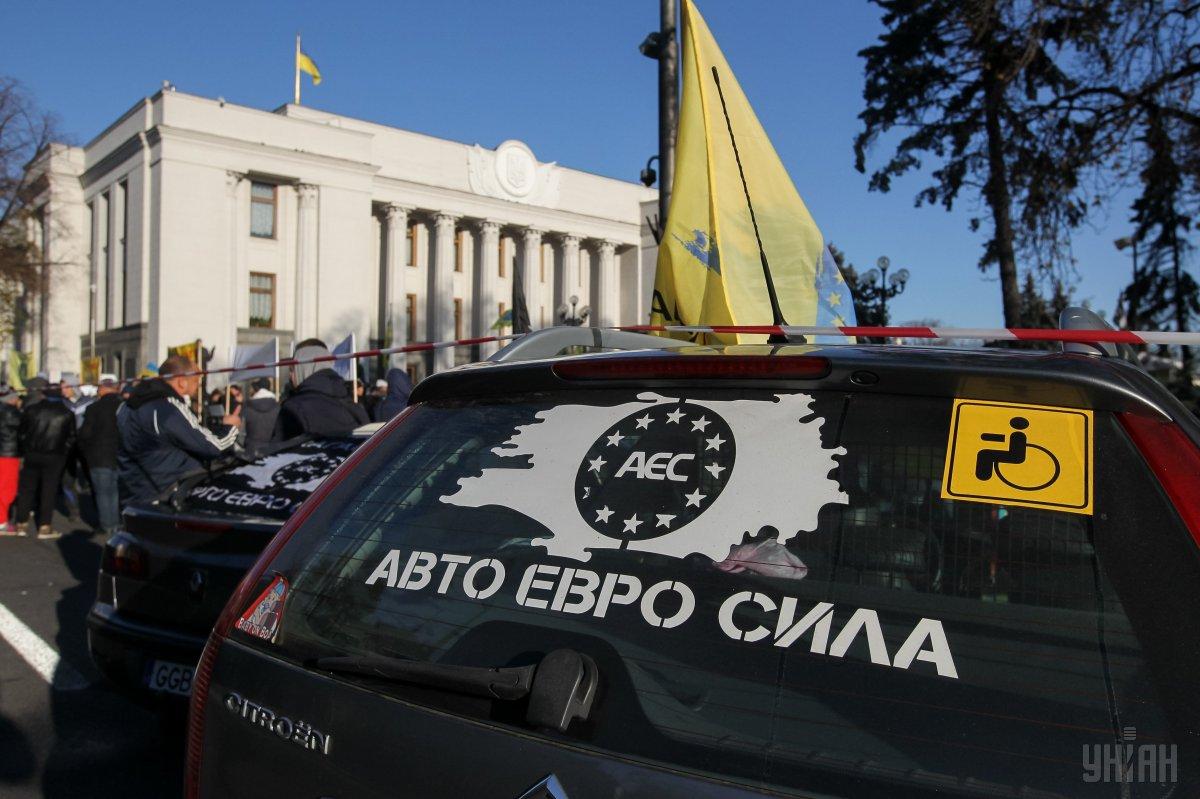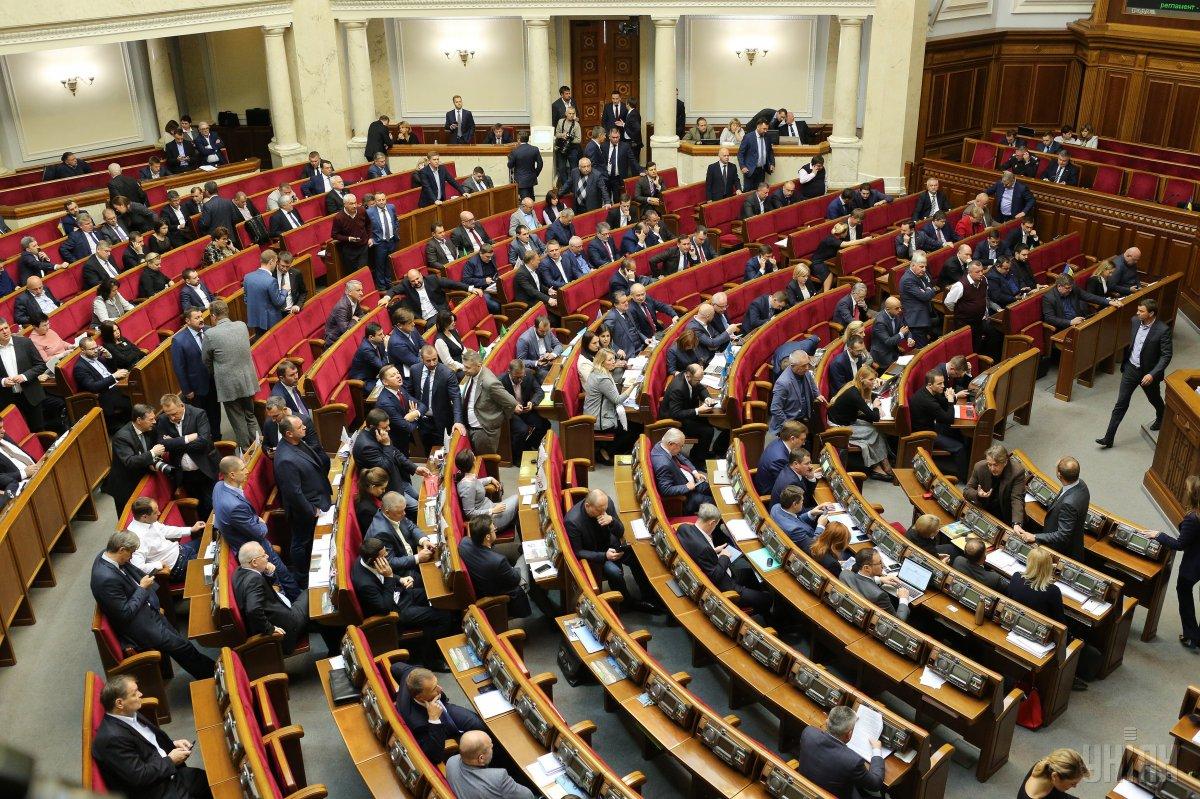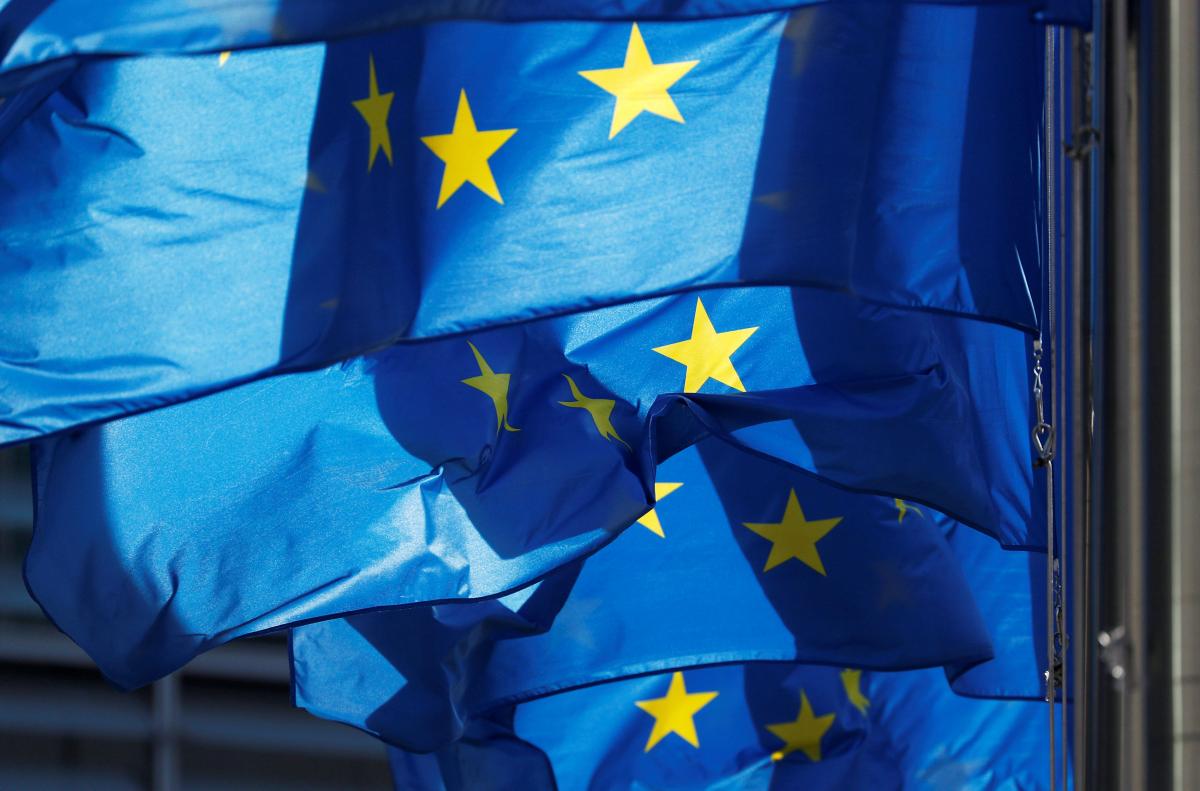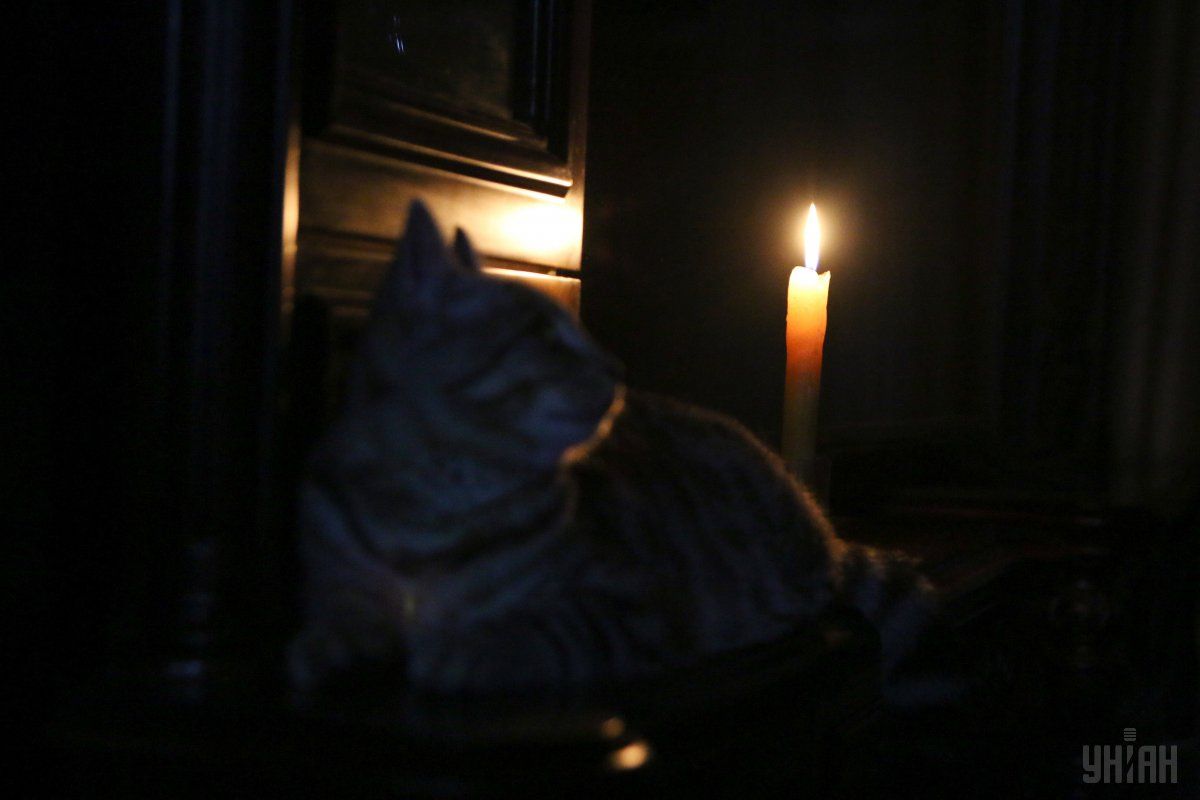
Week's balance: Benefits and fines for drivers of EU-tagged cars, new taxes, and blackout threat in Luhansk region
The Verkhovna Rada, under the pressure of protesting drivers of vehicles with EU registration plates cut the customs clearance fees for such cars but sharply increased fines for those who fail to legalize their vehicles in Ukraine on time. MPs also discussed tax innovations, while President Poroshenko announced that Ukraine would shortly receive the first tranche of the EU aid in the amount of EUR 500 million. Meanwhile, the start of the heating season brought the first "surprise" as coal reserves at Luhansk TPP, owned by DTEK, have exhausted.
One of the most discussed topics of recent months was the legalization of cars with foreign registration plates, nicknamed "EU tags." In the past week, it would seem, the saga would end as the Rada adopted a corresponding law. However, it was not the case.
On Wednesday, activists from the AutoEuroSyla organization launched a mass rally outside the Verkhovna Rada and the Cabinet of Ministers in Kyiv, demanding that the Parliament adopt a law on the legalization of "EU tags" with their amendments taken into account. This never happened.
The rejected amendments were aimed at changing the concept of the model adopted in the first reading of the law, and essentially repeated each other,” Nina Yuzhanina, head of the relevant parliamentary committee, explained.
The next day, the Verkhovna Rada, after long discussions, adopted two laws on the issue. The first one provides for a reduction in the cost of customs clearance of "EU tags": EUR 50 euros is the base rate for cars on gasoline with an engine volume of up to 3,000 cubic centimeters; EUR 100 for cars with engine volume starting from 3,000 ccm, EUR 75 – for diesel cars (up to 3,500 ccm) and EUR 150 for diesl cars with engine volumes from 3,500 ccm. Another norm has been introduced saying that the largest age ratio of the car (the number of full years from the day of production to the day of registration of the vehicle) will be 15. That is, if the car is even older than 15 years, then the maximum factor applied will be 15.
And most importantly, some privileges were granted to drivers of such cars: during the first 90 days from the moment the law enters into force, a 50% discount will be applied for customs clearance. During the first 180 days of the law, no penalties will be applied to the owners of EU tags.
Meanwhile, the problem is that the allotted time for preferential customs clearance might not be enough. According to various sources, there are from 350,000 to 500,000 cars with EU plates in Ukraine, so their owners may simply not have time to go through the procedure. Although, according to Yuzhanina, it is proposed to instruct the Cabinet of Ministers to develop, within a month, a procedure for customs clearance of motor vehicles, taking into account the latest innovations. She also noted that all receipts from the customs clearance of cars in 2018-2019 would be allocated for the Pension Fund.
Another law adopted by the Rada strengthens the control of movement of vehicles with foreign registration plates. Thus, a person who imported a car into Ukraine in transit mode or in temporary import mode will not be able to transfer it to the possession, use or disposal to other persons. It will also be prohibited to use such a car for business or to generate income.
An automated data exchange has been introduced between the fiscal service, the border guards, and the National Police to monitor the EU tags across the country. Penalties for violations are also increasing: for exceeding the allowed period of stay from 10 to 20 days there shall be a fine of UAH 8,500, from 20 to 30 days it will be UAH 85,000, and for more than 30 days (and for the loss or disassembly of the car) – it's UAH 170,000 or the confiscation of the vehicle by a court decision. Fines come into force 180 days from the day following the day the law was published.

Deputies expected to that the adoption of these two bills would solve the problem but the EU-taggers were not happy with the new legislation. The leader of the activists, Oleh Yaroshevich, said that they demand from the president to veto the laws and send them back for revision. Otherwise, activists warn of all-Ukrainian protest action with the blocking of international highways.
New taxes to fill the budget
In addition to the “car laws,” the parliament considered another very important document, on filling the state budget. At the beginning of the past week, on November 5, the Cabinet of Ministers submitted to the Parliament a bill on amending the Tax Code, on which the state budget for the next year is based. This is the second “tax” attempt by the government. In mid-October, the deputies did not support the first version of the innovations. The reason, according to Yuzhanina, was the failure to provide a feasibility report. Meanwhile, the second version didn't have more numbers in it either. The explanatory note states that the adoption of the law will increase revenues to the consolidated budget (under the conditions of 2019) in the amount of UAH 6.3 billion, of which UAH 5.9 billion – to the state budget. A total of 233 deputies supported the government's ideas in the first reading.
The innovations are the following. First, from July 1, 2019, the excise tax on tobacco products will increase by 9%, and from January 1, 2019, the environmental tax rate for carbon dioxide emissions from stationary sources will increase to UAH 10 per tonne with the subsequent gradual increase. In addition, it is expected to increase the rate of rent for the use of subsoil for the extraction of oil and iron ore.
The bill also introduces licensing of production, storage, wholesale and retail trade in fuel, control over the intended use of fuel for aircraft. A separate accounting of the movement of alcohol is also introduced, while a list of requirements is established for enterprises receiving alcohol at a zero excise rate.

According to experts, most of all Ukrainians will be affected by value-added taxation of parcels sent to Ukraine from abroad with a total value over the equivalent of EUR 100 per one recipient from one sender. For this norm, a transitional period is proposed to be set from January 1 to June 30, 2019, during which goods will be taxed in excess of the equivalent of EUR 150. Most Ukrainians reacted to the idea negatively. They are also anxious about the fact that the limit can be reduced to EUR 22, as, for example, in Belarus, as part of the fight against smuggling and corruption. The corresponding petition appeared on the website of the president, which has already collected almost 15,000 signatures from the required 25,000.
Ihor Smelyansky, Ukrposhta CEO, expressed his position: “My personal position is as a citizen of Ukraine, not the head of Ukrposhtai is as following: If Ukraine doesn’t overcome smuggling at EUR 150, then we shouldn't be talking about EUR 22. What happened in Belarus when they introduced '22 Euros'? Budget revenues have shrunk. One of our most profitable branches is in Lutsk. Our dear Belarusians order all their goods there and come to pick them up. We shouldn't repeat this."
Experts believe though that the draft law will undergo numerous edits.
Waiting for EU aid

President Petro Poroshenko last week visited Finland, where the Congress of the European People's Party was held. Upon his arrival, the head of state reported some good news: in the near future, Ukraine will receive the first tranche of the EU aid in the amount of EUR 500 million as part of the billion-dollar macro-financial assistance promised earlier.
“With Vice-President of the European Commission, Valdis Dombrovskis, we talked about the fact that in the near future, in a matter of weeks, EUR 500 million of macro-financial assistance will be allocated,” said Poroshenko.
By the way, Ukraine's people's deputies also contributed to the implementation of these plans. In the past week, the Verkhovna Rada ratified a corresponding agreement with the European Union.
Acting Finance Minister Oksana Markarova, who attended the parliament meeting, stated that all the technical conditions had been fulfilled for receiving the first tranche. According to her, the rate will be no more than 3%, with the term of no more than 15 years.
Ukraine will receive the second tranche when cooperation with the IMF is fully resumed. By the way, in the past week, the Fund's experts visited Ukraine to consult the government on the preparation of the budget for 2019.
Luhansk region on verge of blackout

Coal reserves have exhausted at the Luhansk thermal power station, which is part of Rinat Akhmetov's DTEK and provides electricity to the north of Luhansk region. An extraordinary event, really. After all, its halt could lead to about a million people across the region finding themselves in total darkness and without the benefits of civilization. At the same time, Akhmetov’s company says it is not its fault, at the same time blaming Ukraine's Ukrzaliznytsia railway operator, which, in their opinion, should have built a separate 100 km line specifically for the transportation of coal to the Luhansk TPP.
Head of the association of energy and utilities consumers, Andriy Gerus, shares another angle to the problem that has arisen. In his opinion, the problem is a result of careless moves of the DTEK management.
“DTEK’s management style has led to this: it's about not forming coal reserves for the heating period in the summer, and keeping the minimum volumes at warehouses until the last moment, demanding an increase in tariffs or other preferences,” he said.
By the way, this week, the Antimonopoly Committee was to consider the results of the historic four-year investigation of DTEK’s monopoly in the thermal generation market. However, the meeting was disrupted as representatives of the National energy and Utilities Regulation Commission and Ukrenergo failed to attend. Gerus practically foresaw such an outcome. He stated on Facebook that DTEK would not give up on political blackmail.
“DTEK exports electricity at cheaper prices than it sells to the Ukrainian energy market. DTEK does not form coal reserves at its warehouses every summer, maintains minimum coal stocks until the last moment, thus creating political pressure for a new increase in tariffs. This is exactly what is happening right now at the Kryvyi Rih TPP, where there is only enough coal left for only a few days, and at there is Luhansk TPP, where there is only enough coal left until midnight. Whether the Antimonopoly notices it, we will find out tomorrow,” he wrote on Facebook on the eve of the AMCU meeting. As it turned out, no one has noticed this so far – neither the AMCU, nor the NEURC, nor the prosecutor's office along with the SBU.
Yaroslav Samoliuk

